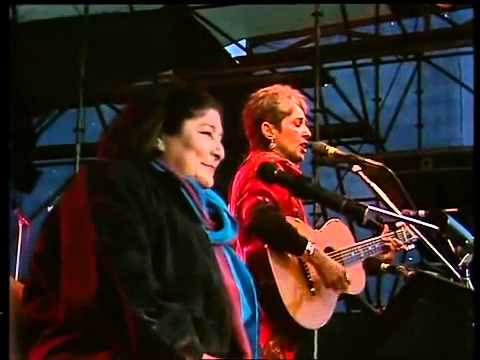|
Gracias a la vida, que me ha dado tanto |


|
Gracias a la vida, que me ha dado tanto |
Mercedes Sosa (9 July 1935 – 4 October 2009), was an Argentine singer who was popular throughout Latin America and many countries outside the region. With her roots in Argentine folk music, Sosa became one of the preeminent exponents of nueva canción. She gave voice to songs written by many Latin American songwriters. Her music made people hail her as the "voice of the voiceless ones". Sosa performed in venues such as the Lincoln Center in New York City, the Théâtre Mogador in Paris and the Sistine Chapel in Vatican City, as well as sell-out shows in New York's Carnegie Hall and the Roman Colosseum during her final decade of life. Her career spanned four decades and she was the recipient of several Grammy awards and nominations, including a posthumous Latin Grammy award for Best Folk Album. She served as an ambassador for UNICEF. After the military junta came to power in 1976, the atmosphere in Argentina grew increasingly oppressive. Sosa faced death threats against both her and her family, but refused for many years to leave the country. At a concert in La Plata in 1979, Sosa was searched and arrested on stage, along with all those attending the concert Their release came about through international intervention.Banned in her own country, she moved to Paris and then to Madrid. Sosa returned to Argentina from her exile in Europe in 1982,several months before the military regime collapsed as a result of the Falklands War, and gave a series of concerts at the Teatro Opera in Buenos Aires, where she invited many of her younger colleagues to share the stage. A double album of recordings from these performances became an instant best seller. In subsequent years, Sosa continued to tour both in Argentina and abroad.
Joan Baez (born January 9, 1941) is an American singer, songwriter, musician, and activist whose contemporary folk music often includes songs of protest or social justice. Baez has performed publicly for over 60 years, releasing over 30 albums. Fluent in Spanish and English, she has also recorded songs in at least six other languages. Although generally regarded as a folk singer, her music has diversified since the counter.culture era of the 1960s, and encompasses genres such as folk rock, pop, countryand gospel music. She was one of the first major artists to record the songs of Bob Dylan in the early 1960s; Baez was already an internationally celebrated artist and did much to popularize his early songwriting efforts. Baez also performed fourteen songs at the 1969 Woodstock Festival and has displayed a lifelong commitment to political and social activism in the fields of nonviolence, civil rights, human rights and the environment. Baez was inducted into the Rock and Roll Hall of Fame on April 7, 2017